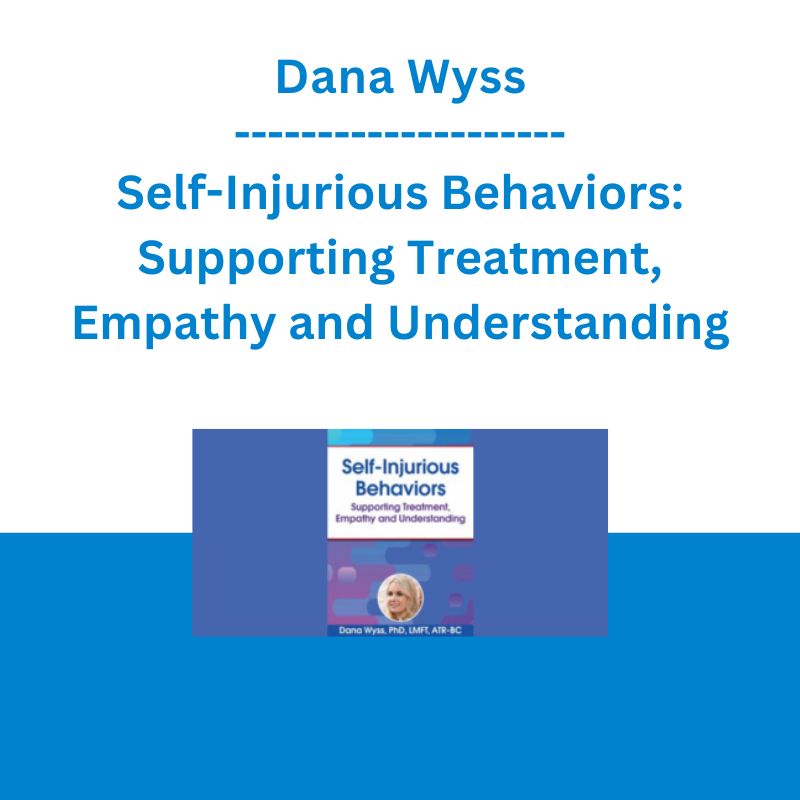*** Proof of Product ***
Exploring the Essential Features of “Dana Wyss – Self-Injurious Behaviors: Supporting Treatment, Empathy and Understanding”
Speaker:Dana Wyss, PhD, LMFT, ATR-BC, RPT™
Duration:1 Hour 31 Minutes
Format:Audio and Video
Copyright:Aug 04, 2022
Media Type:Digital Seminar
Description
Over the last 20 years, I witnessed the acts and aftereffects of children, adolescents, and adults who mutilate their bodies to express overwhelming emotions. I have often wondered what hurt could cause such destruction and isolation of the self. At a time when these individuals need to be most connected, they perpetuate disconnection through self-injury, which others often perceive as horrific. I have also witnessed how mental health providers and families respond to self-injury with shame, disappointment, horror, and helplessness.
Self-injury typically begins in early adolescence but can become more frequent over time. As documented self-injury occurrences have significantly increased in recent years, all mental health professionals, nurses, teachers and support staff are equally at high risk of their own feelings of PTSD, depression, hopelessness, compassion fatigue and burn out.
This recording is an inspiring exploration of the impact that self-injury has on individuals, their families, and service providers. Through expressive activities and discussion this session aims to raise support for us as well as the individuals and families we serve at a time when they often feel the least connection to others. Weaving between the literature, stories from experience, and experiential exercises, the goal is to facilitate self-expression, creative problem-solving and increased therapeutic rapport. This session also aims to support the professional to create strong plans for their own wellness and resiliency while working with such an impactful issue.
Speaker
Dana Wyss, PhD, LMFT, ATR-BC, RPT™, is a board-certified art therapist, a registered play therapist, a marriage and family therapist, holds a doctorate in expressive therapies, and is the coauthor of The Invisible String Workbook. Her doctorate in expressive therapies has led her to create programs integrating art, music, poetry, dance, and animal assisted therapy in the healing process for clients and self-care of staff. For the last 25 years, Dr. Wyss has worked in psychiatric hospitals, group homes, and nonpublic school settings to manage crisis, conduct training, coach staff, and support children and families. Dr. Wyss is a corporate clinical training specialist and clinical/art therapy supervisor at Stars Behavioral Health Group, a company specializing in the treatment of complex developmental trauma. She also owns a small private practice where she specializes in the use of art and play for all ages. Dr. Wyss is a national trainer and consultant with the Center for Trauma Training and national trainer to raise awareness of commercial sexual exploitation of children. She uses her creativity for her own healing as well as to support others.
Speaker Disclosures:
Financial: Dana Wyss has employment relationships with Stars Behavioral Health Group, Center for Trauma Training, and Loyola Marymount University. She receives royalties as a published author. She is an exam writer at ATCB and reviewer for both ATCB and Accreditation Council for Art Therapy Education and Commission on Accreditation of Allied Health Education Programs. Dana Wyss receives a speaking honorarium and recording royalties from PESI, Inc. She has no relevant financial relationships with ineligible organizations.
Non-financial: Dana Wyss is a member of American Art Therapy Association and Association for Play Therapy.
Objectives
- Identify at least 3 types of Self-Injury.
- Identify how to differentiate warning signs and risk factors for different clients.
- Identify 3 or more replacement behaviors to support someone who engages in self-injurious behaviors.
- Name 3 things to say and/ or do to support someone who is currently at risk for self-injury.
- Practice 3 ways to provide nonverbal support to someone who is engaging in self-injurious behavior.
- Develop a strong plan to support your own wellness in response to the work with self-injurious behaviors.
Outline
- 1-3-hour session: Provide at least 3-4 headings
- 3+ hour session: Provide 3-4 main headings with 3-5 bullets below each
- Use brief statements to easily convey what the attendee can expect to learn/gain from the day
- Include a clear reference to techniques/interventions/clinical application related to your topic
- Include acknowledgement of the limitations of the research and any associated risks of the approach/modality you are presenting. This can be as simple as “Limitations of the research and potential risks”
Target Audience
- Counselors
- Educators
- Marriage & Family Therapists
- Nurses
- Psychologists
- Social Workers
- Speech-Language Pathologists
- Other Mental Health Professionals
Please see the full list of alternative group-buy courses available here: https://lunacourse.com/shop/










 Greg Loehr - Advanced Option Trading With Broken Wing Butterflies
Greg Loehr - Advanced Option Trading With Broken Wing Butterflies  Atlas API Training - API 570 Exam Prep Training Course
Atlas API Training - API 570 Exam Prep Training Course